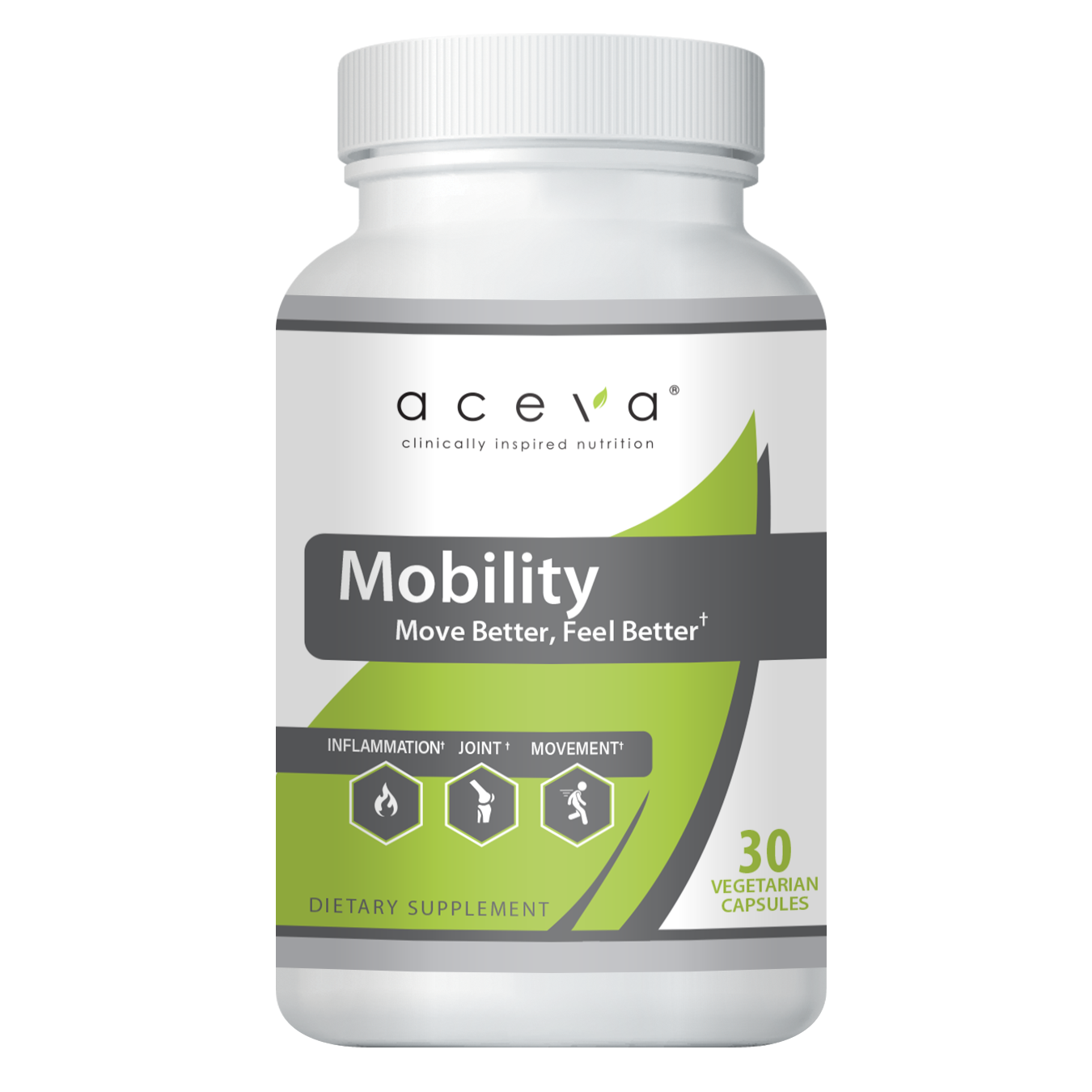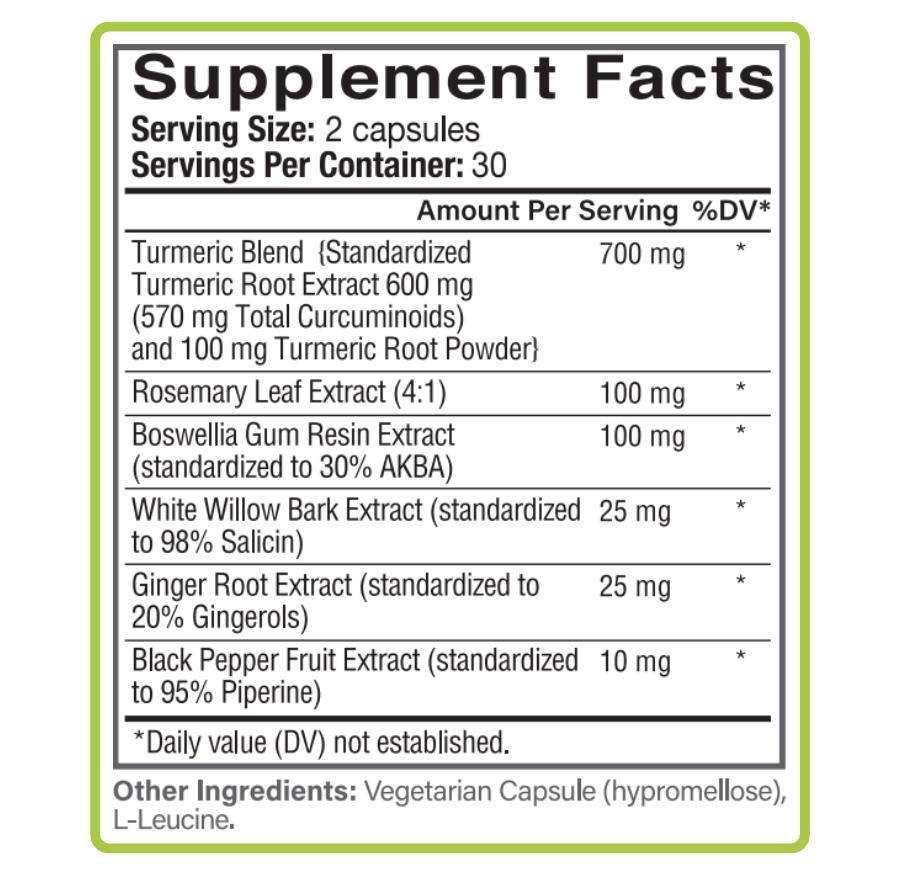Mobility
Mobility
Couldn't load pickup availability
Share
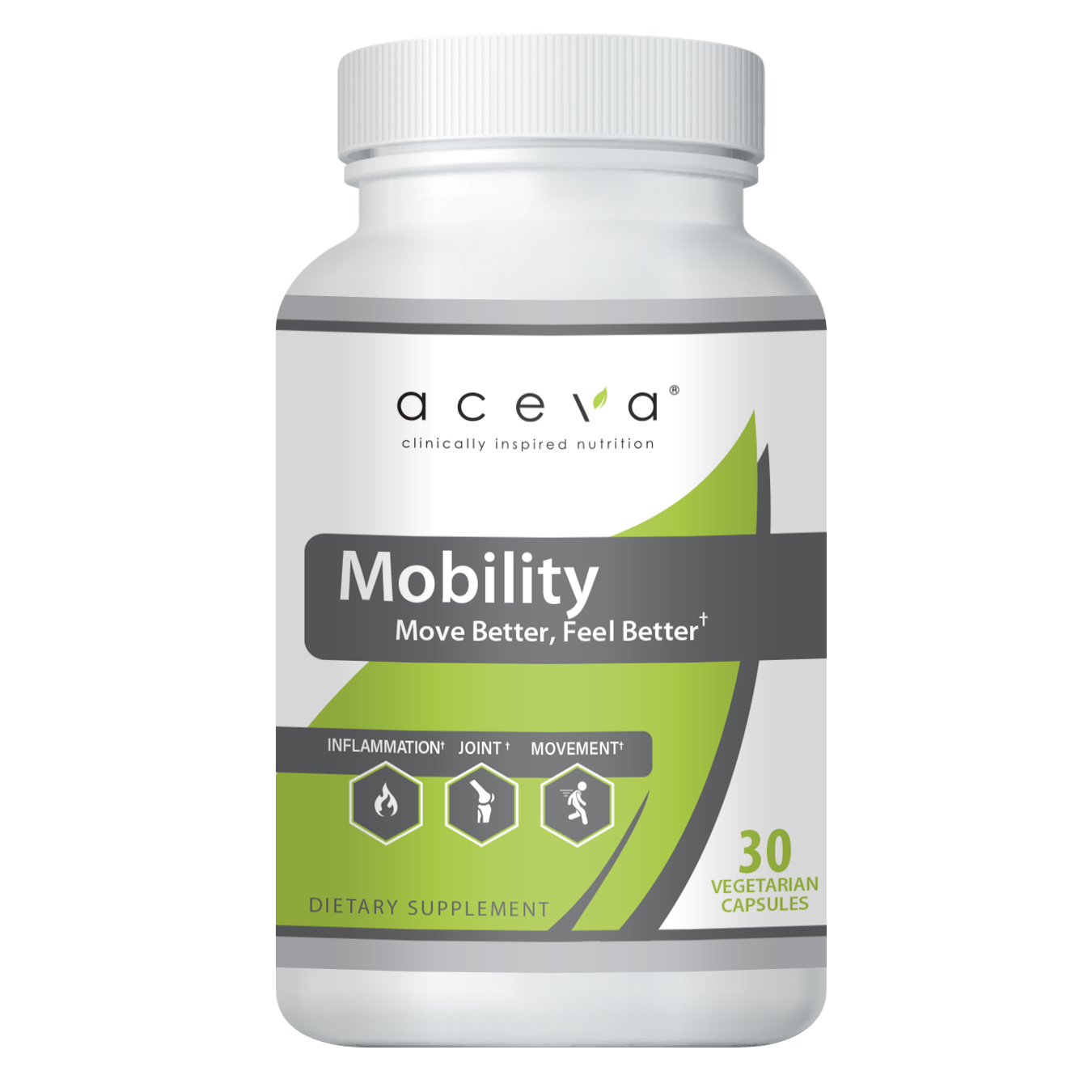
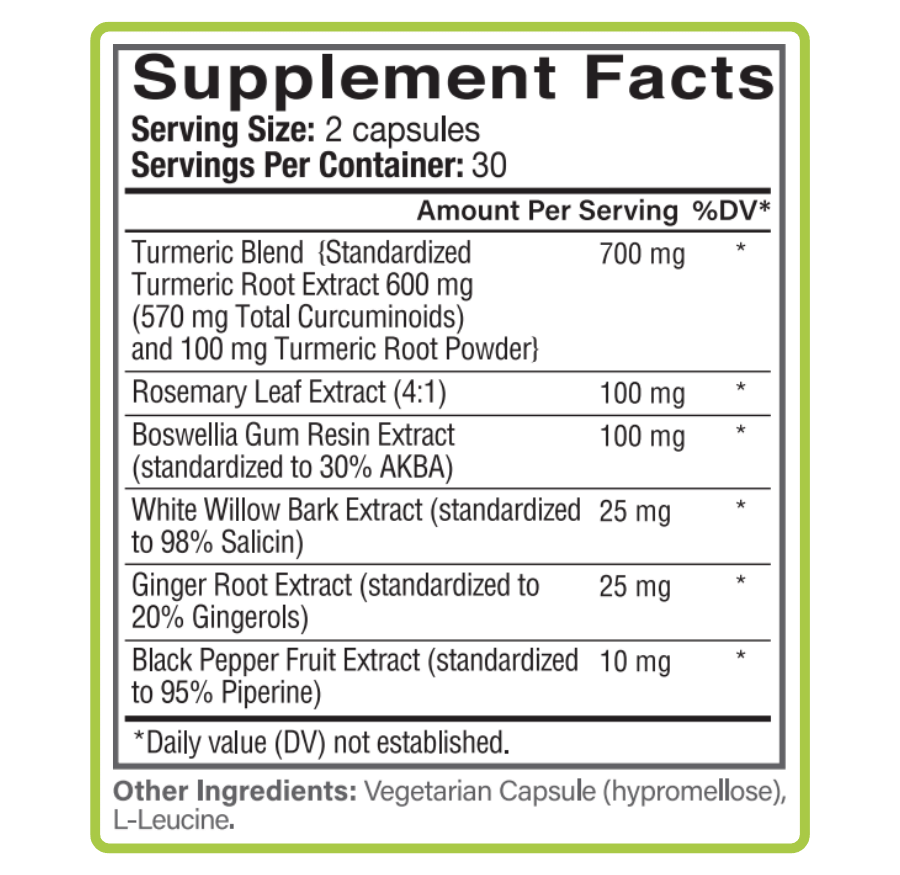
Joint Support | Naturally Reduce Inflammation and Pain
Unlock improved joint function with Mobility, a potent blend of Turmeric and other herbal anti-inflammatories. Enhanced with BioPerine® for rapid absorption and sustained effects, Mobility offers a natural solution to alleviate inflammation and pain, without the side effects common in typical over-the-counter remedies.
A Natural Solution For Reducing Pain and Inflammation
Humans have been practicing various forms of pain management and taking pain remedies for thousands of years from the pain pipes of Native Americans to modern-day pharmaceutical drugs and over the counter (OTC) pain medications. As it has become more increasingly apparent today, many of the drug-derived pain relief remedies come with unwanted side-effects. Educated consumers know to ask the question “What risk am I willing to take on in order to receive the benefit of pain relief?” Recent research published from the most reputable medical journal in England, The Lancet, has found ibuprofen (brand names: Advil, Motrin), to pose the same cardiovascular risk as Vioxx, a drug that was removed from the market for the same such risks. (¹)
A New York Times article in 2012, discussed how Americans consume Ibuprofen with a false sense of security to the point that many athletes (70% of distance runners) consume the drug as a preventative measure for pain. A recent study proved that consuming Ibuprofen before athletic events will actually increase inflammation by causing leakage of protein and enzymes from your intestines into the blood causing systemic inflammation. (²)
Side effects associated with OTC medications include(³):
- Nausea
- Heartburn
- Stomach upset
- Rash
- Liver damage
- Increased risk of heart attack and stroke
A Unique Combination of Inflammation-Pain Reducing Compounds
Turmeric is an orange spice derived from India that has been used for thousands of years in both cooking and medicine. It’s active constituents called curuminoids have been shown to support cardiovascular function, gastrointestinal (GI) health and enhances cognition. Curcuminoids have also been shown to play a crucial role in maintaining the proper inflammatory balance in a variety of bodily systems due to their ability to modulate the inflammatory NF-kB pathway. Many studies have demonstrated the clinical efficacy of the curcuminoids, including their ability to help promote GI health by helping balance inflammation in the body,4,5 promoting GI mucosal health and helping to reduce stomach lining discomfort6. The isolated curcuminoid, curcumin, has been shown to reduce oxidative stress, improve intestinal permeability and improve mood and fatigue7 as well as provide antioxidant protection to the cardiovascular system8.
White Willow Bark (WWB) is an herb well known for its ability to reduce pain and inflammation. It’s earliest recorded dates way back to 500 B.C. by Chinese Physicians. The inner bark of the willow tree contains salicin which converts to salicylic acid in the body, the same compound in Aspirin that is attributed to providing its efficacious benefits. As a result of the diverse blend of antioxidants contained in its bark, WWB has been shown to be an extremely effective analgesic. Herbalists have used WWB to promote health in many ways including to help reduce fevers, pain, inflammation and to help mitigate menstruation symptoms.
Ginger is a flowering plant whose therapeutic constituents (gingerols) are derived from its root. Ginger has many different therapeutic and has been used historically to help with arthritis and other inflammatory conditions. Its anti-inflammatory effects have been attributed to its ability to inhibit the cyclooxygenase and lipoxygenase pathways in the body9. One double-blind trial showed that ginger was just effective as anti-inflammatory medication in helping relieve symptoms of dysmenorrhea10. Multiple double-blind trials have demonstrated ginger’s ability to improve osteoarthritis symptoms, further demonstrating its powerful anti-inflammatory effects11,12.
Rosemary has been touted as a polycrest remedy due to its multiple therapeutic benefits. It has a longstanding historical use for aiding in pain management and muscular ailments. It is thought to provide these benefits by helping improve circulation, improve the flow of congested blood and stimulating the nerves which result in the restoration of muscle sensation.
5-loxin ® Indian Frankincense (Boswellia serrata)
Frankincense is a branching tree derived from India whose active constituents (boswellic acids) have been traditionally used in the Ayurvedic medicine as an antiarthritic, astringent, stimulant, expectorant, and antiseptic. Boswellic acids are selective 5-lipoxygenase inhibitors, meaning they can strategically help promote a healthy inflammatory balance in the body. 5-loxin ® contains at least 30% AKBA, the most biologically active boswellic acid. A double-blind, placebo-controlled trial showed that 5-loxin ® was able to significantly improve osteoarthritis symptoms13. Seventy patients were split into 3 groups and were evaluated for a 90 day period: 100 mg daily, 250 mg daily and a placebo. Both the 100 mg and 250 mg groups saw significant improvements in pain (100 mg: 54% reduction; 250 mg: 59% reduction), stiffness (100 mg: 56% reduction; 250 mg: 67% reduction) and improvement in overall function (100 mg: 41% improvement; 250 mg: 55% improvement) as measured by the WOMAC score as well as reduction in the levels of the cartilage degrading enzyme MMP-3 (100 mg: 29% reduction; 250 mg: 46% reduction) in 90 days. The study also showed that subjects receiving the 250 mg daily experienced relief in as little as 7 days, demonstrating the ingredient’s ability to provide immediate relief.
Bioperine® Black Pepper
Black Pepper has been touted as the “King of Spices” throughout the world due to its pungent properties and therapeutic effects. Bioperine® is a patented form of Black Pepper extract (Piper nigrum) that has been shown to increase absorption of curcumin by 2,000%.
Collapsible content
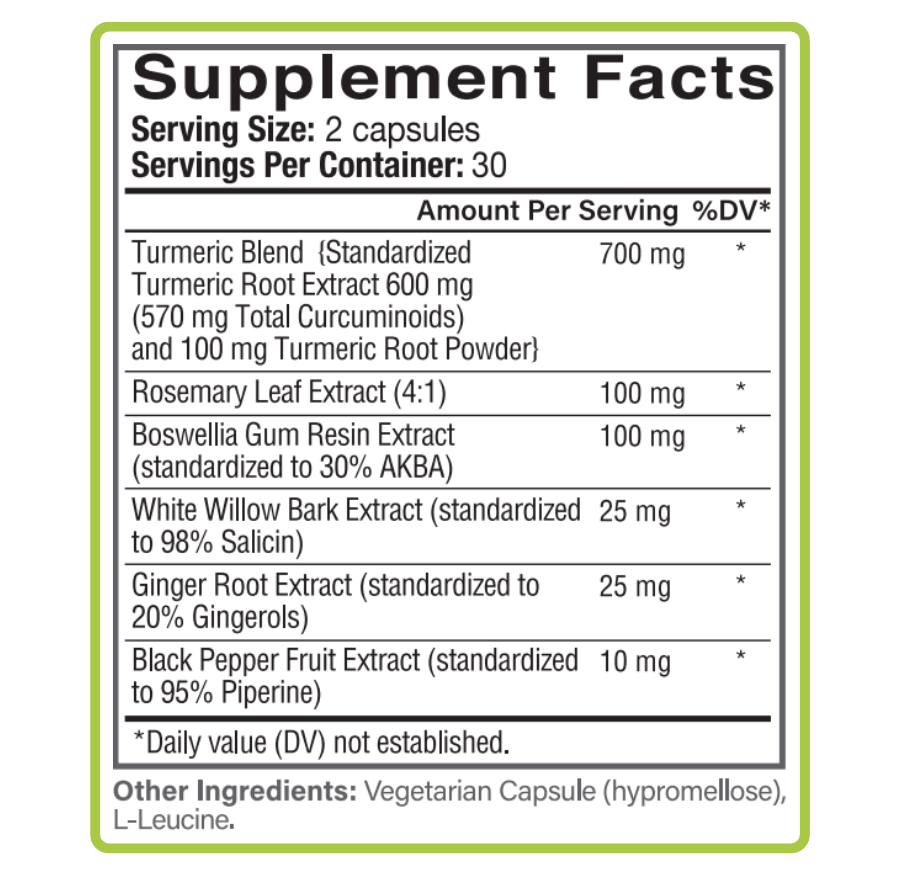
Suggested Use
As a dietary supplement, take two (2) capsules daily or as directed by your healthcare professional.
Formulated To Be Free of Allergens Derived From:
Wheat, soy, dairy, eggs, fish, crustacean shellfish, tree nuts, peanuts, artificial preservatives, sweeteners, colors and flavors.

